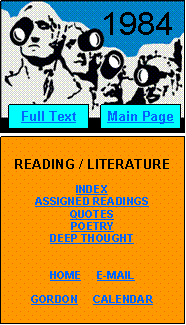|
The modern novel John Galsworthy (1867-1933) showed himself interested in the processes by which old institutions, such as a great Whig family, decay as history advances, but in both style and characterization he is firmly set in the Victorian Age. Of Arnold Bennett (1867-1931) it may be said that he brought to a kind of Thackerayan social realism something of the spirit of the French novel, particularly the anglicized tones of Balzac and Zola. W. Somerset Maugham (1874-1965), though his most considerable achievements lie in the short-story form, wrote novels, like Of Human Bondage, that are infused with the delicious acerbities of French naturalism, and all his work, long or short, is exalted by the influence of Guy de Maupassant. Early 20th-century British fiction needed the impact of an alien tradition to jolt it out of bourgeois empiricism, and perhaps the two major influences were both foreigners who had elected to write fiction in England--Joseph Conrad (1857-1924), Polish-born, to whom English was a second language, and Henry James (1843-1916), an American who had drunk deeply at French fountains and brought to the exercise of his craft a scrupulousness and a concern with aesthetic values that was almost obsessive and, it may be said, very un-English. James's influence on such major English-born novelists as Virginia Woolf (1882-1941), E.M. Forster (1879-1970), and Ford Madox Ford (1873-1939) was in the direction of that concern with style which the English novel, unlike the French, has always tried to resist, and this influence remains a potent one on succeeding generations of novelists, not only in England. Other important Englishmen have remained more interested in content than in style, though in Graham Greene, a Catholic convert, who is primarily known for his "theological" content, there is a very interesting attempt to bring to this a Conradian concern for the solitary-man theme and a Jamesian preoccupation with style. D.H. Lawrence (1885-1930) remains the great modern English novelist who reconciles a highly traditional style (in The Rainbow, for example, he often resembles George Eliot) with a subject matter that is revolutionary in the profundity of its human relationships. And Aldous Huxley (1894-1963), though he indulged in formal experiment in Point Counter Point and Eyeless in Gaza, was always essentially a didactic writer who used the novel form somewhat casually. The same may be said of George Orwell (1903-50), who eschewed stylistic complexity in the interest of a clear message. On the other hand, Evelyn Waugh (1902-66) and Anthony Powell, in a cautious and conservative way, consulted the claims of allusive and evocative prose, as did Wyndham Lewis (1884-1957), who also brought to his novels the aesthetic of an alien art--that of painting. Novelists like Kingsley Amis and Angus Wilson are seen to belong to traditions already old in the time of Samuel Butler. Amis derives from Fielding (Amis' Take a Girl Like You has a moral quality reminiscent of Fielding's Amelia), and Wilson never pretends to be other than a disciple of novelists like George Eliot and Dickens. The Victorian kind of novel, as practiced by writers like J.B. Priestley, satisfies large numbers of British readers, and Jamesian scrupulosity and Joycean experiment alike are regarded with amiable suspicion. Such Englishmen as have experimented in fictional technique have usually found a larger audience abroad than at home. Thus Lawrence Durrell found his Alexandria Quartet (1962) hailed as a masterpiece in France, while English readers merely liked or disliked it. A Clockwork Orange (1962) by Anthony Burgess achieved a large readership in the United States, but it recorded little positive response in the country of its origin. Copyright © 1994-2001 Encyclopędia Britannica, Inc._ |
